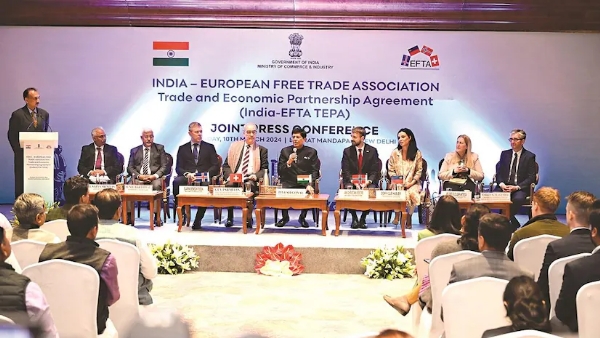India has officially inked a free trade agreement with the European Free Trade Association (EFTA), comprising Iceland, Liechtenstein, Norway, and Switzerland. The signing ceremony took place in the presence of Union Commerce & Industry Minister Piyush Goyal, who highlighted the significance of the agreement. Goyal announced that EFTA has committed to investing $100 billion in India over the next 15 years as part of the free trade pact.
Describing the occasion as momentous, Goyal emphasized that the Trade and Economic Partnership Agreement with EFTA symbolizes the culmination of nearly 15 years of dedicated work and effort. Despite structural differences in various aspects, he expressed confidence in the complementarities between the economies of India and EFTA, foreseeing a mutually beneficial scenario for all nations involved.
Goyal, who co-chaired a meeting on the India-EFTA trade deal in New Delhi, discussed the comprehensive nature of the agreement. Negotiations for the Trade and Economic Partnership Agreement (TEPA) between India and EFTA began in January 2008, aiming to strengthen economic ties. The agreement covers a wide range of areas, including trade in goods, rules of origin, intellectual property rights (IPRs), trade in services, investment promotion, cooperation, government procurement, technical barriers to trade, and trade facilitation.
Highlighting EFTA's global reach, it was mentioned that EFTA already boasts 29 free trade agreements (FTAs) with 40 countries, including Canada, Chile, China, Mexico, and Korea. The four member countries of EFTA— Iceland, Liechtenstein, Norway, and Switzerland—remain committed to fostering free trade and economic integration with their international partners.
ENERGY SECURITY-
Open access solar capacity addition at record 3.2 GW in 2023:
In 2023, India witnessed a remarkable surge in open access solar capacity, with a record-breaking addition of 3.2 gigawatts, marking a 6.66% increase from the previous year. The growth was attributed to various factors, including the reduced cost of solar modules, as revealed in a report. Open access solar entails a setup where a power producer establishes a solar power plant to deliver eco-friendly energy directly to consumers. This significant increase in capacity represents the highest ever recorded in a calendar year.
The cumulative installed solar capacity in the open access segment reached 12.2 gigawatts by December 2023, according to the 'Mercom India Solar Open Access Market Report.' This segment stands out as a bright spot in India's solar market, enticing commercial enterprises and industrial units to transition to solar and other clean energy sources. The report emphasizes the undeniable cost savings potential for businesses, especially with the ongoing decline in solar costs juxtaposed with the rising retail electricity prices. The outlook for this market segment remains highly promising, with anticipated robust growth in 2024 owing to a robust pipeline of projects.
Karnataka maintained its position as the leading state in cumulative installations, contributing 33.1% to the country's overall installations, followed by Maharashtra (13.5%) and Tamil Nadu (11.4%). As of the end of 2023, India had 13.9 gigawatts of projects in various stages of development and the pre-construction phase, underlining the nation's commitment to further expanding its solar energy infrastructure.


No comments:
Post a Comment